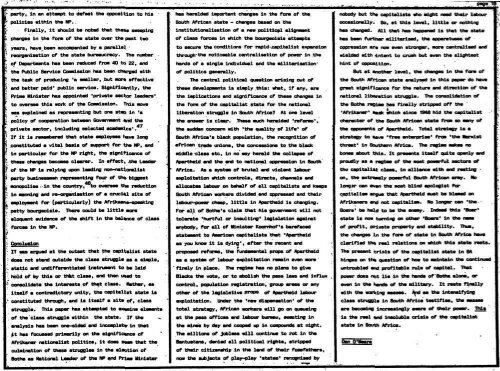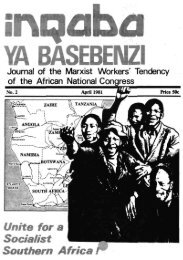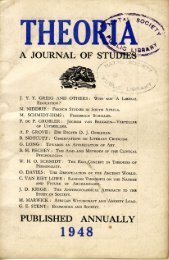You also want an ePaper? Increase the reach of your titles
YUMPU automatically turns print PDFs into web optimized ePapers that Google loves.
^ — :—: __.<br />
* party, In «n ettenpt to defsat the opposition to his<br />
l<br />
pollcli* .Uhln the MP.<br />
Finally, it should M noted that the** sweeping<br />
change* In the for* of the state over the post two<br />
mrt, have baan ecccaiaenisd by a paraxial *<br />
raorgeytlsstlon of the state bureaucracy, Tha mater<br />
of Oepsftawnts has been reduced fn» 40 to 22, snd<br />
tha Public Sarvlca Cosed aalon ha* been chs^gad eith<br />
tha task or producing 'a aaasller, but aora affaotlva<br />
and battar paid' public tavlw. Significantly, tho<br />
Prlae Itlniatar has appointed *prlvata sector laadora*<br />
to ovaraoa thla eork of tho Conalaalon, This aova<br />
sea explained aa representing but ono atop In *a<br />
policy of cooperation bstaesn Govarnaant end tho<br />
private sector, inciting selected ecadealc*'/ 7 -<br />
If It la ie*ssbsrsrt that atata saployese have long<br />
constituted a vital basis of support for tha HP, and<br />
In particular for tha M> riant, tho significance of<br />
; thaoo changes bee pass cloarar. In effect, .tha Leader<br />
I of tho HP to relying upon loading non-natlonallat<br />
party buslnassaan representing four of th% biggest<br />
eonopollee . in tha country, to oversea tha reduction<br />
in earning and •• organ! sotlon of a crucial alta of<br />
eoplo,aont for (particularly) tha Afrtksano opaafclng<br />
patty bourgoolaio. Thara could bo llttlo aora<br />
eloquant evidence of tha shift in the balance Of daao<br />
farcaa In the NP,<br />
at tha outoat that tha capitalist atata<br />
not stand outside tha class atruggla aa a alapla,<br />
atatlo ml undlffarantlatad lnatruaant to be laid<br />
hold of by thlo or thto data, and than used to<br />
\ conaolldata tha interests of mat claaa. Rather, as<br />
itaalF a contradictory unity* tho capitalist atata la<br />
I constituted through, snd la ltaalf a slta of, olasa<br />
struggle. This papar haa attempted to ex**ine slsasnts<br />
of tha claaa atruggla vlthln tha atata. If tha<br />
analyalo haa baan W sldad and lnooaplater in that<br />
*t haa foousaad prlaarlly on tha significance of<br />
Afrikaner nstionallet politics, it does S*aa that tha<br />
culainatlon of thaoa struggles in tha election of<br />
Botha aa National Leader of tha W and Pris* Itlniatar<br />
eaeasaaessaaaea-sswaaaa——eaweeeawwa •^•wawwwawa<br />
haa heralded important chengee In tha for* of the<br />
South Afrlcen stete - chengea based on the<br />
InetitutlonallaeUon of a nea political allgnaent<br />
of claaa forces in which tha bourgeoisie attaapta<br />
to secure tha conditions for rapid-capita list expansion<br />
through'the noticeable centralisation of poser In the<br />
hands of a single individual end the militarisation<br />
of politics generally.<br />
The central political question arising cut of<br />
these develop—nts le slsply thlai shst, if any, ara<br />
tha leplicatlons end significance of these changes in<br />
tha fan of the capitalist atate for tha national<br />
liberation struggls in South Africa? At one level<br />
the eraser le clear. These such heralded 'reforms*,<br />
tha sudden concern -ith 'the Quality of life 1 of<br />
South Africa'* black population, tha recognition of<br />
efrloan trade unions, tha conceaslone to tha blade<br />
•lddle claaa etc. In no say herald tha collopoo of<br />
Apsrthaid end tha snd to national oppression in South<br />
Africa. Aa a syataa of brutal end violent<br />
exploitation which control*, directs, channels.<br />
allocates labour on behalf Of all capitalist* and ki<br />
South African sorters divided and opcraaiad and thalr<br />
labour poser cheep, little In Apartheid is changing.<br />
For all of Botha f s clela that hie govarnaant sill not<br />
tolsrata 'hurtful or insulting' legislation ageinat<br />
anybody, for all of Minister Koorntof"s barefaced<br />
statement to Aasrlcan capitalists that -Apartheid<br />
as you kno* it is dying** after tha<br />
proposed refonaa, tha fundasamtal props of Apartheid<br />
as a syataa of labour exploitation rsealn even aora<br />
* firmly In place. Ihe raglaa haa no plana to give<br />
aiactca the vota, or to abolish tha paea lass end influx<br />
control, population registration, group eraes or my<br />
other of the legislative prope of Apartheid la*our<br />
exploitation. Undar the 'nee dispensation' of the<br />
total strategy, African sorters aill go on ouaualng<br />
at tha peas offices and labour bureau, esaetlng In<br />
the alnes by day and cooped up In conpountf* at night.<br />
The millions of jobless will continue to rot In the<br />
esmtuatana, dented all political rlghta, stripped<br />
of their citizenship in tha land of thalr foe*father*f<br />
tha subjects of play-play •states' recognised by<br />
I ~ in H*-m^^***-—+m-M*-*»*m\ ail • i "<br />
nobody but tha capitalists sho night need their labour<br />
occasionally. So, at thia level, little or nothing<br />
has changed. All that haa happened Is that the stata<br />
has bean further aUlterlaad, tha apparatuaaa of<br />
oppression ara now even stronger, aora centralised and<br />
eleldod with intent to crash but even tha slightest<br />
hint of opposition.<br />
But at another level, the changes in the fora of<br />
the South Afrlcen etate analysed in thia paper do neve<br />
great significance for the neture and direction of the<br />
national liberation struggle. The consolidation of<br />
tha Botha regis* has finally atrlppad off tha *<br />
'Afrikaner* **ek anion since 1946 hid tha capitalist<br />
character of tha South African stata frea ao aeny of<br />
the ojporajnta of Apartheid. Total strategy Is a<br />
strategy to save *frae anton-rlee* froa "the Marxist<br />
threat* in Southern Africa. Tha raglaa eafcas no<br />
bones about this. It presents ltaalf quite openly snd<br />
proudly aa a regis* of tha aoat powerful sectors of<br />
tho capltaliat class, in alliance alth and resting<br />
on, the ewtieasly powerful South African are*/* Ho<br />
lonqir can even the aoat blind apologist for<br />
capital lea argus that Apsrthaid euat be bla-ed on<br />
Afrikaners and not capital la*. Bo longer can 'the<br />
Boars* be held to be the anaay. Indeed thla 'Boer*<br />
state ie noa turning on other •Boers' In tha neae<br />
of profit, private property end stability. Thus.<br />
tha changes In the for* of stata in South Africa<br />
clarified the real relation* on which this stata<br />
Tha present crisis of tha capitalist stata in &A<br />
hlngss on the Question of hoe to eertntaln tha continued<br />
untroubled snd prof 1 table rule of capital. That<br />
doss not Ua in the handa of Botha alone, or<br />
in tha hands of tha solitary. It reeta finally<br />
with tha sorting naoaoe. And aa the intensifying<br />
class struggle in South Africa testifies, tha aaaoeo<br />
ara becoalng increasingly aaare of their poaar. Thla<br />
U tha real and lneoluble crlala of tha capltaliat<br />
etate In South Africa.<br />
^°' > f c M "<br />
IT

















